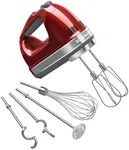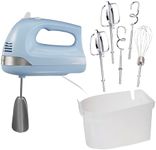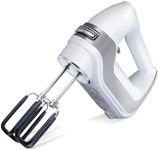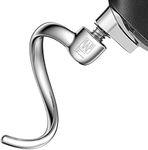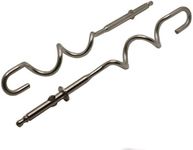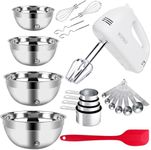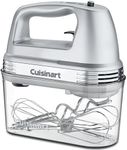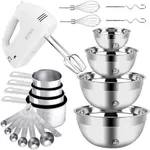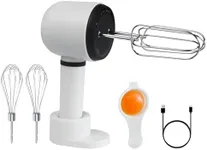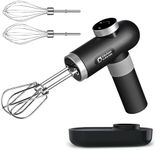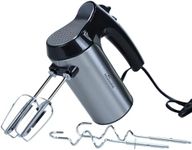Buying Guide for the Best Dough Hook Hand Mixer
Choosing the right dough hook hand mixer can make a significant difference in your baking experience. A good hand mixer with a dough hook attachment can help you knead dough efficiently without the need for a stand mixer. When selecting a dough hook hand mixer, it's important to consider several key specifications to ensure it meets your needs and preferences. Here are the key specs to look out for and how to choose the best one for you.Power (Wattage)Power, measured in watts, indicates the strength of the motor in the hand mixer. This is important because a more powerful motor can handle tougher doughs and larger quantities more efficiently. Hand mixers typically range from 100 to 300 watts. For light tasks like mixing cake batter, a lower wattage (100-150 watts) may suffice. For kneading dough, which requires more power, look for a mixer with at least 200 watts. Consider your typical baking needs to determine the right power level for you.
Speed SettingsSpeed settings allow you to control the mixing process. This is important because different recipes require different mixing speeds. Hand mixers usually come with 3 to 9 speed settings. For basic baking needs, 3 to 5 speeds are often enough. If you frequently bake a variety of recipes, including those requiring precise speed control, opt for a mixer with more speed settings. Think about the types of recipes you make most often to decide how many speed settings you need.
WeightThe weight of the hand mixer affects how comfortable it is to use, especially for extended periods. A lighter mixer (around 2-3 pounds) is easier to handle and less tiring to use. However, a slightly heavier mixer may offer more stability and power. If you plan to use the mixer frequently or for long mixing sessions, consider a lighter model. If you prioritize power and stability, a heavier mixer might be a better choice. Balance your comfort with the mixer's performance to find the right weight for you.
ErgonomicsErgonomics refers to how comfortable and easy the mixer is to hold and use. This is important because a well-designed handle and controls can reduce hand strain and make mixing more enjoyable. Look for a mixer with a comfortable grip and intuitive controls. If possible, try holding the mixer before purchasing to ensure it feels good in your hand. Consider your hand size and any specific comfort needs you have when evaluating the ergonomics of a hand mixer.
AttachmentsAttachments, such as dough hooks, beaters, and whisks, expand the functionality of the hand mixer. This is important because having the right attachments can make the mixer more versatile. Ensure the mixer comes with dough hooks if you plan to knead dough. Additional attachments like beaters and whisks can be useful for other baking tasks. Think about the types of recipes you make and choose a mixer with the attachments that will be most useful for you.
Ease of CleaningEase of cleaning refers to how simple it is to clean the mixer and its attachments. This is important because a mixer that is easy to clean will save you time and effort. Look for mixers with dishwasher-safe attachments and a smooth, easy-to-wipe body. Consider how much time you want to spend on cleaning and choose a mixer that fits your preferences. If you bake frequently, an easy-to-clean mixer can make your baking experience more enjoyable.
DurabilityDurability refers to how long the mixer is likely to last and how well it can withstand regular use. This is important because a durable mixer will provide better value over time. Look for mixers made with high-quality materials and good build quality. Reading reviews and checking the warranty can also give you an idea of the mixer's durability. Consider how often you plan to use the mixer and choose one that is built to last for your level of use.
